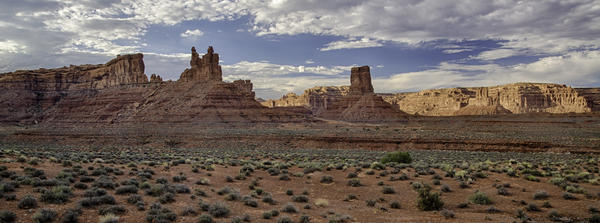
Some Utah legislators, however, are entreating Donald Trump to rescind Bears Ears’s national monument designation on the grounds that it robs Utahns of use of the lands for “energy development.”

By Caroline Matas
Graduate Student, Religious Studies
Princeton University
A Utah national monument is in danger of having its status revoked.
In his last weeks of office, then-President Barack Obama designated 1.35 million acres of southwestern Utah as Bears Ears National Monument. The act was praised as an important recognition of the land’s spiritual significance for local Native American tribes. National monument status, the coalition of 5 tribes said, allowed Native Americans more direct control over and protection of their sacred landmarks.
Some Utah legislators, however, are entreating Donald Trump to rescind Bears Ears’s national monument designation on the grounds that it robs Utahns of use of the lands for “energy development,” USA Today reported.
“Nobody is saying that sacred burial grounds should be disturbed or you should put a McDonald’s drive-thru though them. That’s not the point,” said Utah state Senator Todd Weiler. “The point is those other million-plus acres that aren’t sacred areas.”

While lawmakers hoping to overturn protections on Bears Ears assert that the state would still work with local tribes “to structure a governance and management coalition plan that provides local and state stewardship over the Bears Ears,” Utah Native American leaders are skeptical.
“For too long, Utah has not given Native American tribes the respect we deserve. Utah, after all, did not even allow Native Americans to vote until 1957,” said Shaun Chapoose, chairman of the Ute Indian Tribe Business Committee. “That disrespect continues.”
In a letter to The Salt Lake Tribune, Salt Lake City resident Sylvie Henry concurred. “The U.S. government has a shameful history of repeatedly going back on agreements with native peoples,” Henry wrote. “We as Utahns have the opportunity to support the right thing this time.”

Long before being protected under national monument status, the Bears Ears region has been used for the religious practices of local Hopi, Navajo, Uintah and Ouray Ute, Ute Mountain Ute, and Zuni tribes, Religion News Service reported. Native Americans use Bears Ears as a place of prayer and collect herbs and wood from the region for ceremonial and medicinal use.
“Our religion is very much tied to the land,” Zuni tribe councilman Carleton Bowekaty told Religion News Service. “For many of my people our day starts with prayer, and it’s not just prayer for themselves or their family; it’s for the entire world and therefore for the Earth. …If we don’t have a healthy land we won’t have a healthy people.”

A number of religious environmentalists have come alongside the Bears Ears Inter-Tribal Coalition to support their defense of the land. Hundreds of Mormons have signed on to a letter by the Mormon Environmental Stewardship Alliance advocating for the preservation of Bears Ears’s national monument status.
“Our LDS faith guides us to respect the beliefs and religious practices of other cultures, especially those closest to us. We as a religious community maintain the collective memory of LDS religious persecution and forced migration. We seek to be partners in healing the legacy of religious persecution and displacement anywhere it has happened—including among our Native American brothers and sisters,” the letter said.
“We understand that Native Americans hold their faith histories to be sacred, just as we do ours. Given the degradation of over one hundred thousand sacred ancestral dwellings [and] artifacts of the give tribes of the Bears Ears Inter-Tribal Coalition, and given our nation’s history of broken treaties with these tribes…it is imperative that their ancestral lands continue to be protected as a national monument.”

Evangelical and Mormon environmental activists also banded together to denounce Utah legislators’ attempts to overturn the designation as “nothing more than a political football.”
“Make no mistake: [Utah’s congressional delegation’s] efforts are not motivated by a desire to be good stewards but by an ideological struggle over state’s rights and the status of the Antiquities Act,” Mitch Hescox and George Handley wrote in Deseret News. “As Christians…we want no part of legislation or attitudes that are demeaning to or dismissive of [indigenous communities’] sovereignty.”
Whether Donald Trump is either willing or able to overturn the Bears Ears national monument designation remains unclear. In the century-long history of the Antiquities Act, which allows the President of the United States to create national monuments from federal lands, no president has ever sought to rescind a former president’s designation.
Although U.S. representative for Utah Jason Chaffetz raised the topic in a meeting with Trump last month, Trump has not yet offered public comment on the issue.
Originally published by The Religious Liberty Project, Harvard Divinity School
